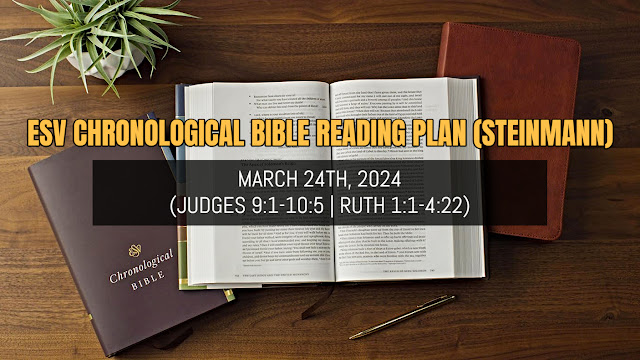(A) The book of Ruth is an illustration of the Gospel. This is no side story. The book of Ruth is the connective tissue between the book of Judges (Ruth 1:1) and the kingly line of David (Ruth 4:17). Ruth was a Moabite woman who lived in Israel during the time of the Judges, when some of the most disturbing situations in all of Scripture were happening regularly in Israel. This was a dark time. And it was dangerous. And Ruth and her mother-in-law Naomi were hungry. And so she was in need of kindness, or favor. But the book of Ruth also shows how even during that time, God was slowly enacting his rescue plan for his people through the story of Ruth and Boaz. And that's why the book of Ruth wraps up with a genealogy, which says: "Nahshon fathered Salmon, Salmon fathered Boaz, Boaz fathered Obed, Obed fathered Jesse, and Jesse fathered David." Despite the reigns of Jerubbaal (Gideon) and Saul, David was the first "true" king of Israel, descended from the line of Judah, the one through whom the Messiah would come. But why, out of all of those names in the genealogy at the end of Ruth, did God want Ruth and Boaz's story to end up in our Bibles? Why not the Tales of Obed? Why not the book of Salmon, Boaz's father? (Well, maybe something about the story of Boaz's dad would have seemed a little fishy.) I believe that the story of Boaz and Ruth is in our Bibles, because in God's wisdom, he knew that this particular story would point us to Jesus. Take a look at how this book illustrates the Gospel for us. Boaz, the one from whom Jesus descended, comes from Bethlehem. He is God's chosen kinsman-redeemer. In Boaz's union with Ruth, just like in the saving work of Jesus, both Jew and Gentile are grafted in together and become one people, even part of the royal family of God. Boaz, like Jesus, comes out into his harvest field and, finding someone living under the curse (which the Moabites were under), who is willing to leave all else behind, shows favor/grace to them, and takes them into his household and makes them part of his family.
(B) God gives us a new identity. Take a look at Ruth 2 specifically here. The people that Ruth comes from, the Moabites, are part of a people who were under the curse and judgment of God. But Ruth shows us that, to all who seek God’s favor, even those who were once far from God or under judgment, there is room in God’s family for them. So many times in this passage, Ruth is not called “foreigner.” She’s not called “cursed woman.” She’s not called “sinner.” What is she called, by both Naomi and Boaz? She’s called daughter. And that’s a picture of the Gospel for sure. That though we were far from God, though we sought answers in all the wrong things, though we were by nature under a curse, though we were experiencing spiritual famine in the midst of dark times, Jesus—God in human flesh, descended in his humanity from the line of Boaz, found us out in his harvest field and he brought us in. He showed us favor. He wrapped his arm of protection around us. He gave us the best of what He had. He pronounced blessing over us. He called us his children. He redeemed us. He sought us. Jesus, the true and greater Boaz, has done for each of us, us Ruths, what we could not have done for ourselves. He is the one in whom we find favor, and we may find our rest in Him.
DO - What Is Our Part?
How can we respond in our worship, attitude, and actions? In our attitude, I think this would give us a greater sense that our identity is not in the things that we have done, or that have been done to us. But God gives us a new identity that is centered around what our relationship is to him. In the end that is the thing that matters most.
PRAY - How Does This Bring Us to God?
Whether in response to anything pointed out here, or something else in your reading, take some time before you close up your Bible to pray in response to God.


No comments:
Post a Comment
Enter into the conversation! No anonymous comments.